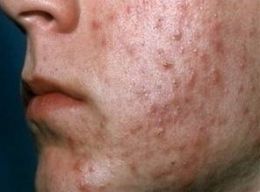It is thought that adult acne in women is more common because of the reproduction cycles a woman goes through such as menstruation, pregnancy, child birth and menopause. And in some cases hormonal products such as the pill can be used by doctors as a very effective adult acne treatment to produce some hormonal changes which can have positive results on the woman’s adult acne. In fact this can be the best treatment for adult acne of this nature.

Normally though, adult acne does not result in a total face breakout as teenage acne can do, so can be more easily controlled by some form of masking such as makeup which negates the need for adult acne treatments. There may be spots, but not so likely to be thousands of them.
The only real reason for an adult acne treatment, or any acne treatment at any age, is cosmetic. And so where a cosmetic effect can be achieved by other means the need for a treatment is removed.
There are thought to be external factors which also contribute to adult acne, amongst them are stress, cosmetics and diet. Unfortunately none of these is sufficiently understood either so it is hard to get some hard and fast rules about what not to do and what to do.
The remedies for adult acne are the same for other acne. First see your doctor to check it’s normal acne and not something more serious. Next try out some of the very good adult acne treatments on the market which may control your adult acne. These adult acne treatments are, in fact, the same treatments used for our teenagers.
One thing that is known though, acne is not caused by eating too much chocolate as was sometimes said to be the case. Cheese is ruled out too.
Filed under: Acne in adult, allergic reaction | Tagged: hormonal changes, makeup¸, reproduction cycles | 1 Comment »

